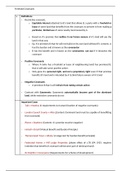Summary
Summary Freehold Covenants PQ Notes (First Class)
- Course
- Institution
- Book
Comprehensive first class Property Law PQ notes from University College London (2018/2019). Notes include concise case summaries, key reasonings to reconcile conflicting case law and detailed answer outlines to problem questions
[Show more]




